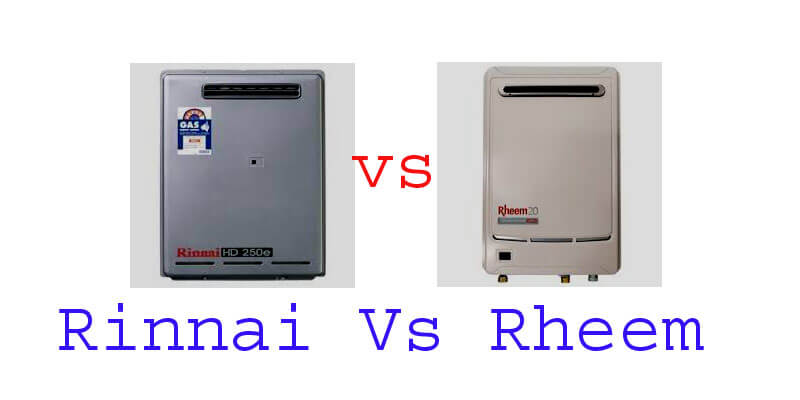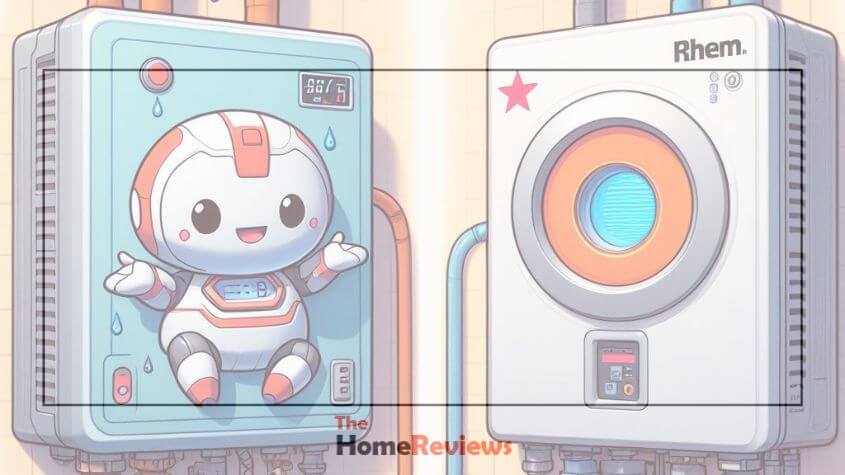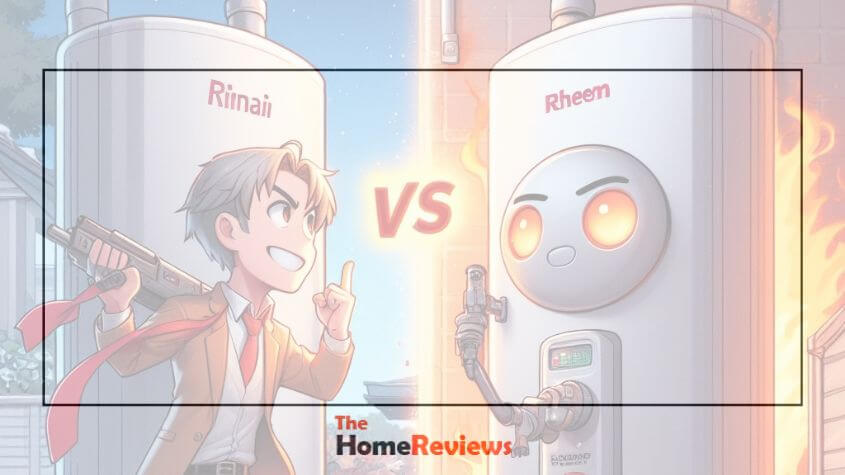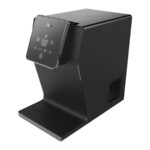Rinnai and Rheem are two popular brands of tankless water heaters with similar features and performance. Choosing between them depends on individual preferences and needs.
When it comes to tankless water heaters, Rinnai and Rheem are two names that stand out for their quality and innovation. Both brands offer similar products with features that appeal to various consumers. Rinnai is known for its energy-efficient products, while Rheem offers affordability and versatility.
Ultimately, the choice between Rinnai and Rheem lies with the individual user, based on their preferences and specific needs. In this article, we will delve deeper into the features of both brands and what sets them apart from each other.

Understanding Rinnai And Rheem Tankless Water Heaters
Overview Of Rinnai Twh
Rinnai tankless water heaters are acclaimed for their compact design, energy efficiency, and endless hot water supply. These water heaters are equipped with circ-logic technology, which improves efficiency by recirculating hot water throughout the entire house. Other key features of Rinnai include:
- Digital controller for temperature adjustment
- Wi-fi capability
- Low-NOx emissions
- High thermal efficiency
- Designed for indoor or outdoor installation
- Robust warranty
Overview Of Rheem Twh
Rheem tankless water heaters are widely recognized for their reliability, durability, and high-quality build. These water heaters are designed to be easy to install and come in both indoor and outdoor variants. Other key features of Rheem include:
- Electronic controls for effortless operation
- Condensing gas or electric options
- Low-NOx emissions
- High thermal efficiency
- Hot start programming for instant hot water
- Smart home integration
Key Differences Between Rinnai And Rheem
When it comes to tankless water heaters, Rinnai and Rheem are two of the best brands on the market. Here are some of the critical differences between these two brands:
Quality And Durability
Rinnai and Rheem both have excellent quality and a reputation for durability. However, Rinnai’s Japanese-made components are considered to be of higher quality than Rheem’s American-made parts.
Price Point
Compared to Rheem, Rinnai Twhs are generally more expensive due to their innovative features and better overall quality.
Size And Installation
Rheem tankless water heaters come in more compact sizes than Rinnai. Rinnai’s products, on the other hand, are bulkier and require more space for installation.
Energy Efficiency
Both Rinnai and Rheem offer high levels of energy efficiency, but Rinnai has a slight edge due to its circular technology, which can save money on utility bills.
Pros And Cons Of Both Rinnai And Rheem
Pros of Rinnai:
- Superior technology and overall build quality
- Robust warranty
- Endless hot water supply
- boosts ultra-low NOx emissions
Cons of Rinnai:
- More expensive than Rheem
- Locker hot water flow rate
Pros of Rheem:
- Affordable compared to Rinnai
- Easy to install
- Smart home integration
- Hot water supply can reach temperatures of 185°f
Cons of Rheem:
- lower-quality parts than Rinnai
- Limited warranty compared to Rinnai
Overall, if you’re looking for the best quality and maximum efficiency and don’t mind paying a premium price for it, then Rinnai is the way to go. However, for those seeking a more affordable option without sacrificing reliability, Rheem is an excellent choice.

Performance And Output Comparison
Understanding Performance And Output Of Twh
Tankless water heaters (TWH) are a modern and innovative way to supply hot water to homes or businesses efficiently. Unlike traditional storage heaters, which provide an endless supply of hot water, they only heat the water when it is needed, resulting in reduced energy usage and lower utility bills.
Comparison Of Performance And Output Of Rinnai And Rheem Twh
When it comes to choosing between Rinnai and Rheem, one of the most important factors to consider is performance and output. Here are some key points to help you decide which is best for your needs.
Maximum Flow Rate
Rinnai twh is known for its high flow rate, which provides hot water faster and more efficiently than rheem twh. Depending on the model, Rinnai can deliver up to 11 gallons per minute, making it the ideal choice for households with high hot water demands.
On the other hand, rheem has a maximum flow rate of between 7 and 9 gallons per minute, which can still cater to a medium-sized family’s daily water usage.
GPM (Gallons Per Minute) Ratings
In terms of gallons per minute, Rinnai is the clear winner, with a higher gpm rating compared to Rheem. However, as mentioned earlier, it depends on the number of people using hot water in the household or business, and Rheem’s gpm rating is adequate for small to medium-sized families.
Hot Water Output Consistency
Rinnai has a more consistent hot water output, meaning that the temperature of the water remains stable even when multiple appliances are running simultaneously. So, whether you are using a shower, washing machine, or dishwasher, you can be sure that the hot water output remains consistent.
Rheem, on the other hand, may have inconsistent hot water output when multiple appliances are running simultaneously, but it is still an excellent choice for a family’s daily hot water needs.
Pros And Cons Of Both Rinnai And Rheem
Here’s a quick summary of the pros and cons of both Rinnai and Rheem:
Rinnai Twh
- Pros: high flow rate, consistent hot water output, Energy Star certification, low NOx emissions, reliability, and durability.
- Cons: Expensive, requires professional installation and maintenance.
Rheem Twh
- Pros: affordable, energy star-certified, easy to install, suitable for small to medium-sized households.
- Cons: lower flow rate, inconsistent hot water output, may not last as long as Rinnai twh.
Both Rinnai and Rheem have their own unique features and benefits. Ultimately, the decision depends on your budget, family size, hot water needs, and personal preferences. Consult with a professional plumber to assist you in finding the best solution for your needs.
Energy Efficiency Comparison
Explanation Of Energy Efficiency And Why It Matters
When it comes to choosing a hot water system, energy efficiency is an important factor that cannot be overlooked. Energy-efficient heaters can save you money on your energy bills and reduce greenhouse gas emissions. Energy efficiency is simply the ratio of the energy output of a heater to its energy input.
The higher the energy output in comparison to the energy input, the more energy-efficient the heater.
Comparison Of Energy Efficiency Of Rinnai And Rheem
Rinnai and Rheem are both renowned hot water system manufacturers that offer a range of tankless water heaters. When it comes to energy efficiency, let’s compare the Rinnai and Rheem models.
AFUE (Annual Fuel Utilization Efficiency) Ratings
Afue ratings measure the energy efficiency of gas heaters. The higher the AFU rating, the more energy-efficient the heater.
- Rinnai’s two models have an AFUE rating ranging from 82% – 95%.
- Both models have an AFUE rating ranging from 80% – 93%.
Energy Star Ratings
Energy Star is a government-backed program that certifies products that meet certain energy efficiency standards.
- Rinnai’s two models have an energy star rating of 0.82–0.95.
- Rheem’s two models have an energy star rating of 0.82–0.93.
Pros And Cons Of Both Rinnai And Rheem
Before choosing between the Rinnai and Rheem models, it is important to consider the pros and cons of both.
Pros Of Rinnai Twh
- High energy efficiency saves money on energy bills
- Longer lifespan in comparison to tank heaters
- A compact design saves space in your home
- Recirculation technology ensures hot water is instantly available
Cons Of Rinnai Twh
- High upfront costs
- Technical installation may require professional help
- Fluctuating hot water temperatures in low-flow situations
Pros Of Rheem Twh
- Cost-effective in comparison to other twh models
- Easy to install
- Multiple venting options
- Overheat prevention technology ensures safety
Cons Of Rheem Twh
- Lower energy efficiency compared to Rinnai twh models
- Limited warranty
- May require frequent maintenance
When it comes to choosing between the Rinnai and Rheem models, it primarily comes down to your needs and budget. If energy efficiency is a top priority, Rinnai Twh models may be the best choice for you. However, if you’re on a budget and prioritize affordability and easy installation, both models may be a better fit.
Cost Comparison
Understanding Cost Factors Of Twh
Tankless water heaters (twh) have become increasingly popular in recent years as they provide many benefits such as energy efficiency, space-saving, and endless hot water supply. However, it is essential to consider the cost factors associated with these appliances before making a purchase decision.
The cost of a unit can vary depending on several factors, including the unit’s size, type, and brand, as well as installation costs, long-term operational costs, and maintenance costs. When comparing Rinnai vs Rheem, several cost factors must be considered.
Comparison Of The Costs of Rinnai And Rheem Twh
When comparing the cost of Rinnai vs Rheem, it is essential to consider the initial purchase price, installation costs, and long-term operational costs.
Initial Purchase Price
The initial purchase price is the first cost you will need to consider when buying a twh. It is worth noting that rinnai twhs are generally more expensive than rheem twhs, but the price difference may be justified, given the higher efficiency of rinnai units.
On average, rheem twhs cost between $500 to $800, while Rinnai twhs range from $800 to $1,200.
Installation Costs
Installation costs will largely depend on the complexity of the installation and your location. Rinnai twhs require professional installation and may cost more to install than Rheem twhs, which you may be able to install yourself.
Long-Term Operational Costs
Long-term operational costs are another essential factor to consider when comparing Rinnai vs Rheem. Both brands offer energy-efficient units that can save up to 40% on energy costs. However, Rinnai units may be more efficient than Rheem units. You must research energy ratings and calculate the appropriate size unit for your household’s needs to understand long-term operational costs.
Pros And Cons Of Both Rinnai And Rheem
Both Rinnai and Rheem have their pros and cons. Here are some of the pros and cons of both brands:
Rinnai Twh
Pros:
- High energy efficiency
- Endless hot water supply
- Compact size
- large range of models to choose from
Cons:
- Higher initial purchase price
- Requires professional installation
- Limited availability in smaller cities
Rheem Twh
Pros:
- Reliable brand
- Low initial purchase price
- Simple DIY installation process
Cons:
- May not be as energy efficient as Rinnai,
- Limited hot water supply
- Limited model options to choose from
When comparing Rinnai vs Rheem, it is essential to consider various cost factors, such as the initial purchase price, installation costs, and long-term operational costs. Both brands offer efficient and reliable units that will provide hot water to your household, but ultimately, you need to research thoroughly and determine which one is best for your household’s needs.

Frequently Asked Questions
What are the differences between Rinnai and Rheem?
Rinnai and Rheem are two popular brands of tankless water heaters. Rinnai is known for its advanced technology, while Rheem is renowned for its affordability.
Which brand is more energy-efficient, Rinnai or Rheem?
Both Rinnai and Rheem produce energy-efficient tankless water heaters. However, Rinnai’s tankless water heaters are known to be more energy-efficient than Rheem’s.
Which brand is more durable, Rinnai or Rheem?
Rinnai and Rheem both produce durable tankless water heaters. However, Rinnai’s tankless water heaters are known to last longer and have a better warranty than Rheem’s.
Which brand offers better customer service, Rinnai or Rheem?
Both Rinnai and Rheem offer excellent customer service. However, Rinnai has a better reputation for providing quick and efficient customer service.
Which brand provides better value for money, Rinnai or Rheem?
Both Rinnai and Rheem provide great value for money. However, if you’re looking for a more advanced and energy-efficient tankless water heater, Rinnai is worth the extra investment. If you’re on a budget, Rheem offers a great, affordable option.
Conclusion
After comparing Rinnai and Rheem, it is clear that both companies offer high-quality tankless water heaters that can meet the needs of different households. Rinnai is better suited for larger households that need a higher efficiency rating and more advanced features, while Rheem is ideal for those who are operating on a tighter budget.
Ultimately, the choice between the two largely comes down to personal preference, based on individual needs, preferences, and budgets. However, despite the differences between these brands, one thing is certain: both Rinnai and Rheem provide reliable and efficient hot water solutions.
Before purchasing a tankless water heater, make sure to carefully consider individual needs and preferences to make the best decision.




